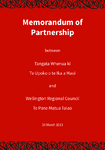Local government legislation requires councils to take account of the perspective(s) of Māori on many matters. Initially, councils’ key requirements came from the Resource Management Act 1991. This Act contains obligations for councils to consult with iwi on resource management matters. The Local Government Act 2002 contains provisions that are broader in definition and scope. This Act requires councils to take appropriate account of the principles of the Treaty of Waitangi (Te Tiriti o Waitangi) and maintain and improve opportunities for Māori to contribute to local decision-making processes.
Memorandum of Partnership
The Memorandum of Partnership is an agreement that outlines how tangata whenua and Greater Wellington Regional Council work together. The Memorandum of Partnership is built on and replaces the Charter of Understanding (1993, revised 2000) and establishes a structural and operational relationship between the Council and tangata whenua, in the context of the Treaty of Waitangi and the legislation which gives functions, duties and powers to the Council.
Signatories of the Memorandum of PartnershiP:
- Ngāti Kahungunu ki Wairarapa, represented by Ngāti Kahungunu ki Wairarapa Charitable Trust
- Ngāti Raukawa ki te Tonga, represented by Ngā Hapū o Ōtaki
- Ngāti Toa Rangātira, represented by Ngāti Toa Rangātira Inc.
- Rangitane o Wairarapa, represented by Rangitāne ō Wairarapa Inc.
- Taranaki Whānui ki te Upoko o te Ika, represented by Port Nicholson Block Settlement Trust
- Te Ati Awa ki Whakarongotai, represented by Ati Awa ki Whakarongotai Charitable Trust
- Greater Wellington Regional Council | Te Pane Matua Taiao
Memorandum of Partnership between Tangata Whenua ki Te Upoko o te Ika a Maui and Wellington Regional Council Te Pane Matua Taiao


date_range Published 13 Aug 2021
Download now (PDF 4.9 MB) get_appWorking with Mana Whenua
We work with our mana whenua partners to sustainably manage and protect our natural resources, and to promote the social, economic, environmental and cultural wellbeing of our communities. Our partnership with mana whenua is important to us, as it ensures our partners can be recognised and supported in maintaining their role as kaitiaki (guardians) of their ancestral lands.
Ara Tahi – Iwi/Greater Wellington Regional Council Leadership Forum
Ara Tahi is a leadership forum of the six tangata whenua groups and Greater Wellington Regional Council. Ara Tahi was established in 1991 as a Māori advisory group and now operates as a joint leadership forum between iwi and Greater Wellington Regional Council, providing an opportunity for discussion on key strategic issues for the Region.
Developing Māori capacity
Greater Wellington is focused on developing Māori capacity through the development and implementation of our Māori Outcomes Framework, Te Whāriki. This framework sets out the strategic direction for developing authentic partnerships with mana whenua and improving outcomes for Māori.
Greater Wellington Regional Council is developing Māori capacity by:
- Implementing Te Whāriki, Māori Outcomes Framework
- Implementing Te Iti Kahurangi, Māori Capabilities Framework
- Developing Mātauranga Māori Framework
- Developing Māori Partnership Engagement Framework
- Growing Kōtuitui Network for Māori staff at Greater Wellington
- Including iwi appointees to committees and advisory bodies:
- One representative member and one rangatahi observer from each iwi authority in the Region to the Long Term Plan Committee.
- six persons to Te Upoko Taiao – Natural Resources Plan Committee for their skills, attributes or knowledge relevant to the work of the committee and including their knowledge of the rohe of the relevant iwi authority to which they belong
- Appointing to the Wairarapa Committee, one member each to represent Ngāti Kahungunu ki Wairarapa and Rangitāne ō Wairarapa
- Appointing one member each, nominated by Port Nicholson Block Settlement Trust and Te Rūnanga o Toa Rangatira Inc. to the Te Awa Kairangi / Hutt River Valley Subcommittee
- Appointing to the whaitua committees, members from each iwi authority whose rohe falls entirely within the Whaitua boundary to represent the interests of that tangata whenua grou
- Holding technical workshops for iwi and Council staff
- Supporting iwi projects
- Providing iwi capacity funding
- Operating a Māori Relations team (Te Hunga Whiriwhiri) to provide enhanced assistance and advice
There are also a number of activities to increase the capacity of councillors and staff to appreciate and understand Te Ao Māori, Te Reo Māori me ngā tikanga.
We hope that building capacity through these avenues will enable and support Māori to contribute to decision-making processes. We continue to work on ways we can build stronger relationships with Māori and meet our new obligations under the Local Government Act 2002.
Get in touch
- Phone:
- 0800496734
- Email:
- info@gw.govt.nz
